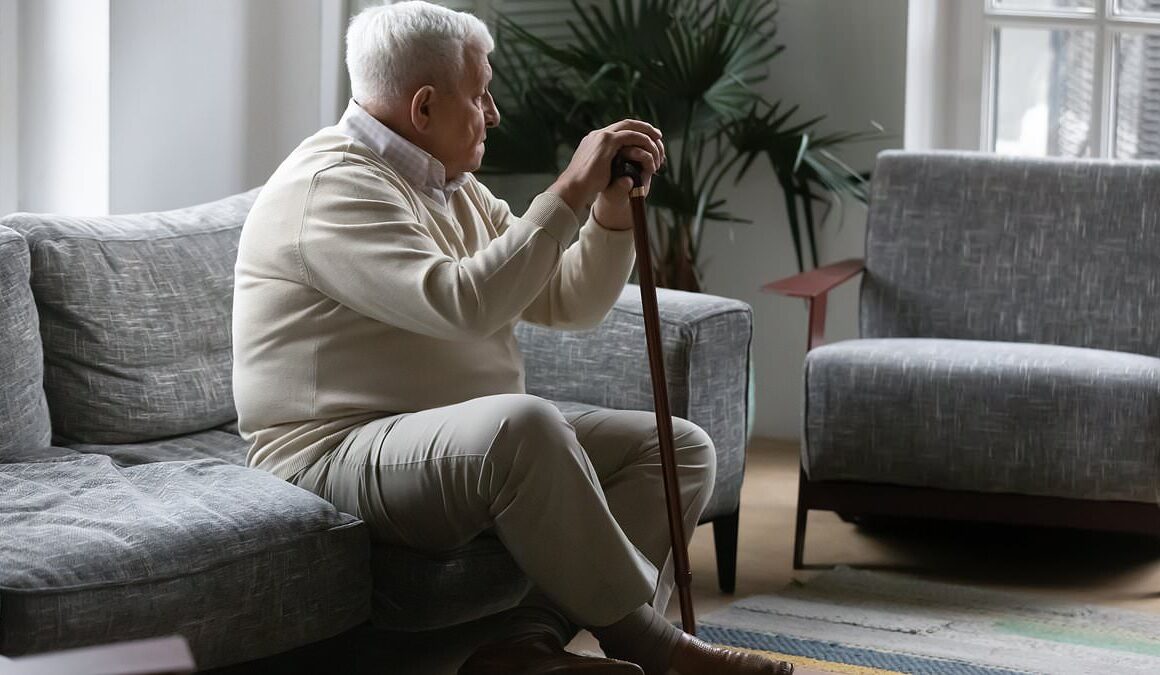If you were a fan of TV sitcoms in the Eighties, you’ll probably remember The Golden Girls. Set in Miami, it followed the lives of four mature ladies who simply refused to grow old gracefully.
There was Dorothy the whip-smart divorcee, Rose the dippy but loveable widow, Blanche the feisty Southern belle and Sophia an elderly Sicilian who dished up marinara, mockery or motherly advice depending on her mood.
This was old age as it had never been seen before on television. The ladies’ lives were filled with jobs, concerts, dances, weekends away, and a revolving door of gentlemen callers.
But if its depiction of retirement was groundbreaking, it wasn’t necessarily true to life.
To be sure, some older people lead busy and fulfilling lives but for others it is a time of tight finances, failing health and profound loneliness.

Increasing numbers of elderly people are living alone, leaving them vulnerable to loneliness
Figures released last week from National Records of Scotland showed a huge jump in the number of Scots living alone – up 100,000 over the last decade.
Sixty per cent of the increase is accounted for by people aged 65 and over.. We live in an ageing society, you might say; this sort of thing is to be expected.
True enough, but the rise is much steeper north of the border. At 13 per cent since 2011, it is more than double the rate in England and Wales.
Those aged 55 and older are twice as likely to live alone than those aged 16 to 54. Little wonder, then, that 35 per cent of over-75s report feeling lonely some or most of the time.
We tend to think of loneliness as an unfortunate situation but nothing more than that. However, research has linked feelings of solitude to serious deterioration in people’s health and wellbeing.
The World Health Organisation says: ‘The effect of social isolation and loneliness on mortality is comparable to that of other well-established risk factors such as smoking, obesity, and physical inactivity.’
Age Scotland chief executive Katherine Crawford wants the Scottish Government to make addressing later-life loneliness a ‘national priority’ and says it’s ‘vital that we all play a part in tackling this public health crisis’.
Before we get onto that, it’s worth pointing out that some older people live alone by choice. They enjoy their own company and are able to visit friends or relatives when they feel like it.
They keep themselves occupied reading, gardening, shopping and taking trips away whenever they can.
They don’t consider themselves deserving of pity and would find it condescending to be told their lives are suffered in solitude.
But there are many others who live alone, often because of bereavement, and a good number of them do suffer.
We don’t see that suffering and so we tell ourselves it is not happening. This sums up our attitude to older people: ignore and forget.
The political class has got into the habit of thinking of those in later life as financially sorted and therefore doing fine.
Over-65s are more likely to own their own home and benefit from the state pension triple-lock.
That latter policy was less about reducing pensioner poverty and more about buying their votes but it came with a social consequence that we couldn’t see until now.
With pensioner incomes somewhat insulated from economic headwinds, it became easier to forget about an entire demographic of people. They’re all right, Jack.
Only they weren’t and aren’t. Quite apart from the fact that many pensioners face financial difficulty, their needs aren’t covered by pounds and pennies alone.
For almost a generation now, on both sides of the Tweed, local government has been starved of cash, prompting cuts that often fell on facilities and services older people relied upon.
You might have experienced this yourself, perhaps seeing your community hall close down or the local council’s spending on social events pared back.
And as the scope of society has shrunk, so too many older people find themselves shut off from the world and forgotten about.
Not asking for help because they’re embarrassed. Not wanting to be a burden on anyone. Not knowing, perhaps, what support services are available.
This is all wrong. Living to old age should be a blessing, not an endurance… Retirement should mark the beginning of a new life spent with friends and loved ones, whiled away in hobbies and projects, fulfilled and feeling part of a wider community.
That this is often not the case is the result of a choice – a choice we make about the kind of society we want to be.
If we want to be a cold-shoulder society, a great mass of strangers winding in and about each other for all our days, we’re going about it the right way.
But if we want to be a caring, compassionate society, in which we all have responsibilities to one another, then things are going to have to change.
There is no silver bullet that can solve Scotland’s loneliness crisis but there are sensible measures that could make small but meaningful improvements in people’s lives.
One of the most vital is improving public transport. It’s all well and good having a free bus pass but what use is it if services are constantly being cut or the buses aren’t clean and safe?
Public transport should be seen as a lifeline service and invested in accordingly.
The cuts mentality that has brought Scottish local government to its knees must come to an end.
As social service providers, councils are on the frontline in the battle against loneliness and they should have the support of the Scottish Government. They deserve fair funding, not yet more squeezes.
There needs to be some innovative thinking, too. Underused facilities like libraries could double as community hubs for activities targeted to older people.
The private sector also has a role to play and should be encouraged to donate premises, transportation and other resources to tackling loneliness. A joined-up approach is essential.
For those unable to leave the house, technology can be a blessing and, as we saw during the pandemic, you’re never too old to learn how to join a Zoom call or FaceTime the grandchildren in Australia.
Virtual events might not be the same as interacting with people in real time but they could help lessen feelings of isolation.
We should set minimum standards on the quality of life you can expect when you grow old in Scotland.
Dignity, respect, financial security, quality health and social care, and a feeling of belonging.
Even if more of us are living alone, we shouldn’t be condemned to lonely lives.
We can’t all be swinging sixty-somethings raising merry hell in Miami but our later years should still be golden.







